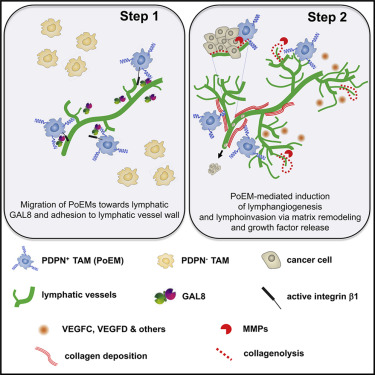Macrophage Blackening May Promote Breast Cancer Metastasis
When breast cancer cells spread in the body, they diffuse mainly through the lymphatic system, which usually removes excess fluids and waste from our tissues. Now, scientists at the team of Professor Massimiliano Mazzone (VIB-KU Leuven Cancer Biology Center) have discovered a new subpopulation of immune cells called PDPN-expressing macrophages (PoEMs) that express the flat-footed protein, which can change the tissue in the vicinity of the tumor, thereby promoting the spread of cancer cells. Removal of these PoEMs in a mouse model greatly reduces the ability of breast cancer cells to metastasize to other parts of the body.
The Lymphatic Passage of Cancer Cells
The lymphatic system drains excess fluid and removes waste from our tissues. Lymphatic vessels also play a role in the spread of breast cancer. Growing tumors often cause physical stress on the surrounding environment, which makes these lymphatic vessels leak and the tumor cells are more accessible.
Cancer cells utilize these loopholes to move around the body and begin to grow tumors elsewhere, this process is known as metastasis. Previous studies have shown that breast cancer cells are more likely to metastasize through the lymphatic system, and the more lymphatic vessels near the tumor, the worse the patient's prognosis will be.
Therefore, effective treatment of lymphatic vessel development and growth can reduce metastasis, thereby reducing the number of breast cancer deaths.
PoEMs That Promotes Transfer of Tumor Cells
The development and growth of lymphatic vessels near the tumor is sometimes supported by certain immune cells. In this new study, Pawel Bieniasz-Krzywiec from the Mazzone team discovered a subpopulation of these cells called PDPN-expressing macrophages (PoEMs).
But in this particular environment, what is the importance of the existence of PoEMs? Professor Mazzone explained, "PoEMs are characterized by unique genetic features associated with changes in the tumor environment. Specifically, they are an excellent source of collagen 1, and collagen 1 constitutes a scaffold for lymphangiogenesis. PoEMs also digest certain parts of this environment which releases a variety of growth factors that stimulate lymphangiogenesis, opening up new avenues for cancer cell transmission. "
The team further observed that PoEMs loosen the connections between the cells that make up the lymphatic vessel wall, making it easier for cancer cells to enter these lymphatic systems. In mice, inhibition of PoEMs prevents "environmental remodeling", which greatly reduces lymph node and distant organ metastasis.
Prevent PoEMs from Fighting Cancer
These findings provide strong evidence for humans. With the help of clinicians and pathologists at the University of Cullen and Uz Antwerp, the researchers further tested their findings in human cancer samples. Pawel Bieniasz-Krzywiec provides more details: "Based on the results of the mouse experiments, human breast cancer samples showed a positive correlation between the presence of PoEMs around the lymphatic vessels and lymph node involvement and organ metastasis. These observations paved the way for the use of PoEMs blockers in cancer therapy, particularly for cancer-associated lymphatic vessels, without triggering lymphedema associated with current strategies. "
From a broader perspective, this study highlights an emerging concept that the characteristics of immune cells are intrinsically linked to the specific environment in which they are located. The study by Professor Mazzone's team first described a subset of immune cells that are associated with tumor lymphatics and promote their growth.
Professor Mazzone concluded: "Our findings have changed our understanding of the growth of lymphatic vessels near the tumor and will certainly stimulate new and exciting research in this field."
Reference
- Pawe Bieniasz-Krzywiec et al. Podoplanin-Expressing Macrophages Promote Lymphangiogenesis and Lymphoinvasion in Breast Cancer, Cell Metabolism (2019). DOI: 1016/j.cmet.2019.07.015


Your email address will not be published. Required fields are marked *